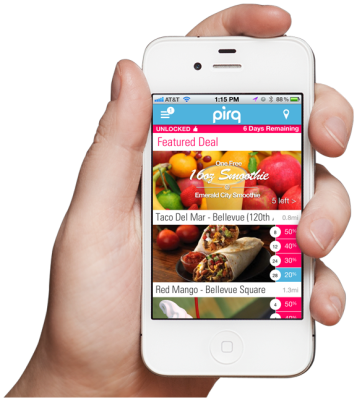We last heard from Pirq when the company announced a nice deal with Apple to offer its employees a special app for discounts on food at restaurants near its offices in Cupertino — a relationship that just might develop into something further, according to sources at the time. Today, however, we have some more news about Pirq expanding other parts of its service. The company has picked up an extra $1.2 million in funding from existing investor Rally Capital (a fund headed by former Nextel CEO Dennis Weibling); and it is adding a digital punchcard to its retail restaurant deals offering, as it prepares to take the service nationwide and to other categories besides food.
James Sun, the CEO, says the company is also preparing for another significant round of funding in the new year with to ramp up its service once more. Today’s $1.2 million takes the total invested by Rally into Pirq up to $3.2 million.
Pirq’s service, which offers discounts on food to users of its app, is different from deals from the likes of Groupon and Living Social, in that it uses an algorithm to measure when restaurants are less busy. This has the catchy name “SmartYieldTM Program.” In real-time, that service then combines that data with the location of app users to provide information on deals that they can come in and redeem near them (or whatever location they choose). The deals, meanwhile, get paid for at the point of sale, rather than in advance as you would do with Groupon.
The punch card getting added to the service today, Sun says, was borne out of conversations that Pirq has been having with its restaurant customers, who wanted to “monetize the frequency” of visits from some customers. That’s no surprise: loyalty services are a prime area in the retail sector and have been highly targeted by mobile app companies (companies like 5 Stars and Belly also chasing that business, and represent at least two of Pirq’s biggest competitive threats).
What’s notable here is that Pirq’s punchcard will actually work independent of the app. Restaurants will be able to link up with users and offer rewards for repeat visits; and it will also be able to track and analyse those visits by way of a user’s mobile phone number and a short messaging code. So if you have the app, the totals will tally there and you can rack up visits using a Microsoft Tag; but if you don’t have an iPhone or the app downloaded, you can still collect rewards via text messages to a short code.
After your visit, the retailer can also use the phone number to send you targeted offers to drive another visit.
Sun says Pirq is filing a patent for the punchcard part of the service, and he believes that the way it leverages a basic phone feature could be part of a bigger trend.
“I think the new trend in mobile will be about leveraging older features like SMS to enhance the app experience,” he says.
The rewards service and deals app are being rolled out now in anticipation of a wider national push for Pirq and an eventual move beyond food to other kinds of retail categories, capitalizing on the fact that all businesses reliant on footfall face ebbs and flows in traffic. “Starting next week our salesforce is contacting six different verticals,” Sun says.
What Pirq has yet to integrate into its deals and rewards service are payments. In one sense that is good: some don’t like to pay it forward in a Groupon-model. (That was one of the praises of Pirq the last time we wrote about it.) But on the other hand, it cuts out a potential revenue stream for Pirq in helping facilitate purchases.
“We’re still trying to figure out who will win the mobile payments space. It could be point-of-sale vendors, or Square, or Isis, or something else,” says Sun. “We’re still waiting on the winner before we try to say to the vendors: this is how our payment system will work.”
With its Apple relationship still intact, Sun wouldn’t say even a small speculative word to me about whether Apple’s Passbook service — or any other initiative from the company — might be the “something else” that could end up being the killer mobile payment method.
As for pricing, the loyalty service, which will start to get rolled out commercially in October 2012 along with a new iPhone app, is being sold separately from Pirq’s deals service.
It will be $50 per month, per location for any size business. Sun says that each participating location will also have an Android tablet to display with details for how the loyalty scheme works. That will work for chains like Taco del Mar and Little Ceasars, but he says Pirq is still working out how to offer a similar experience for places where you don’t approach a counter to pay. “That’s a more complicated process,” he says.
